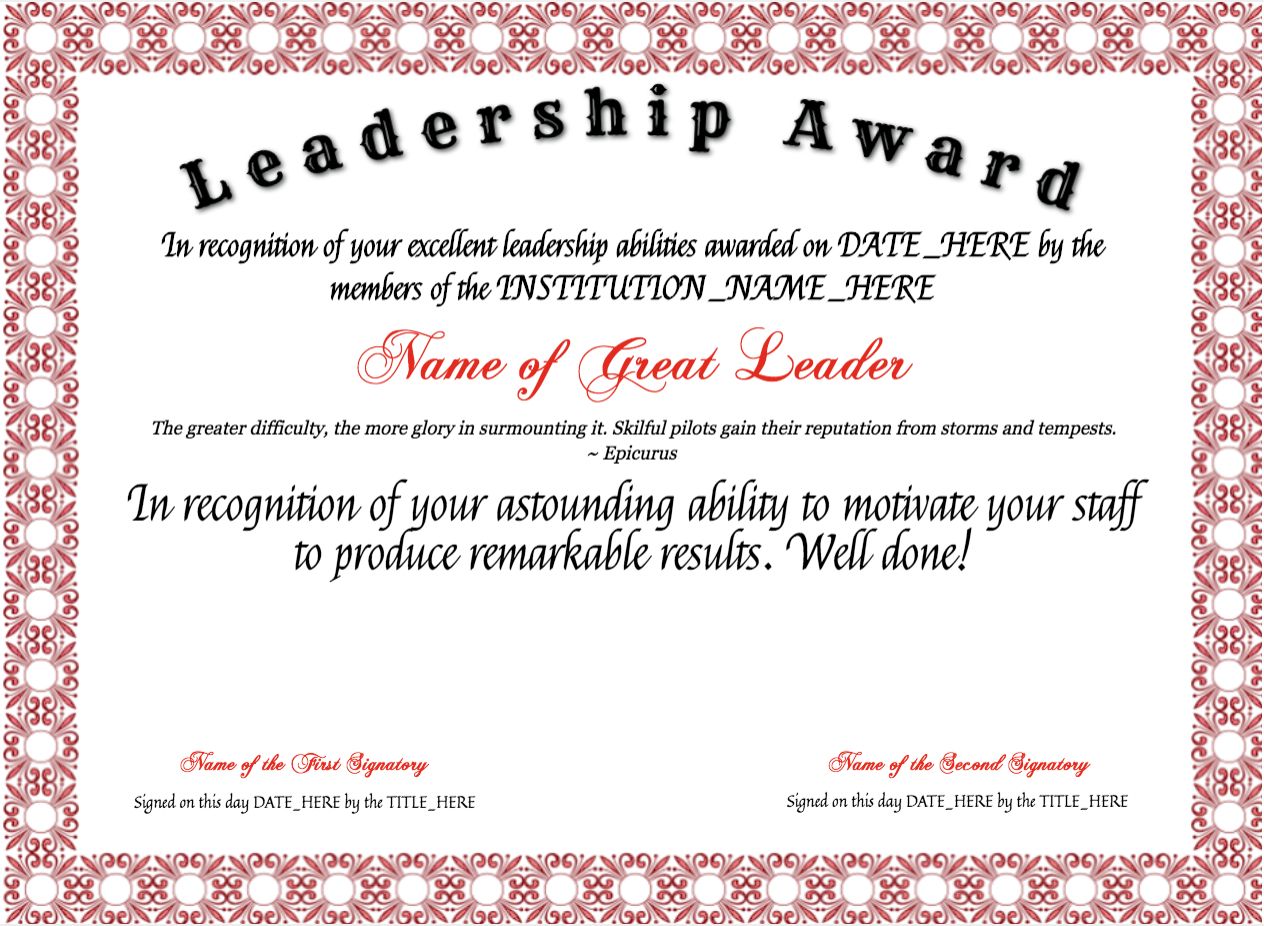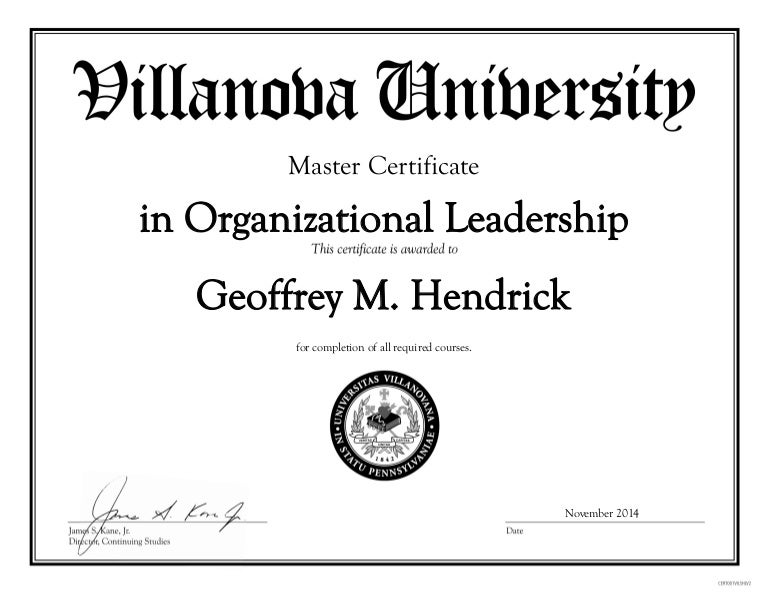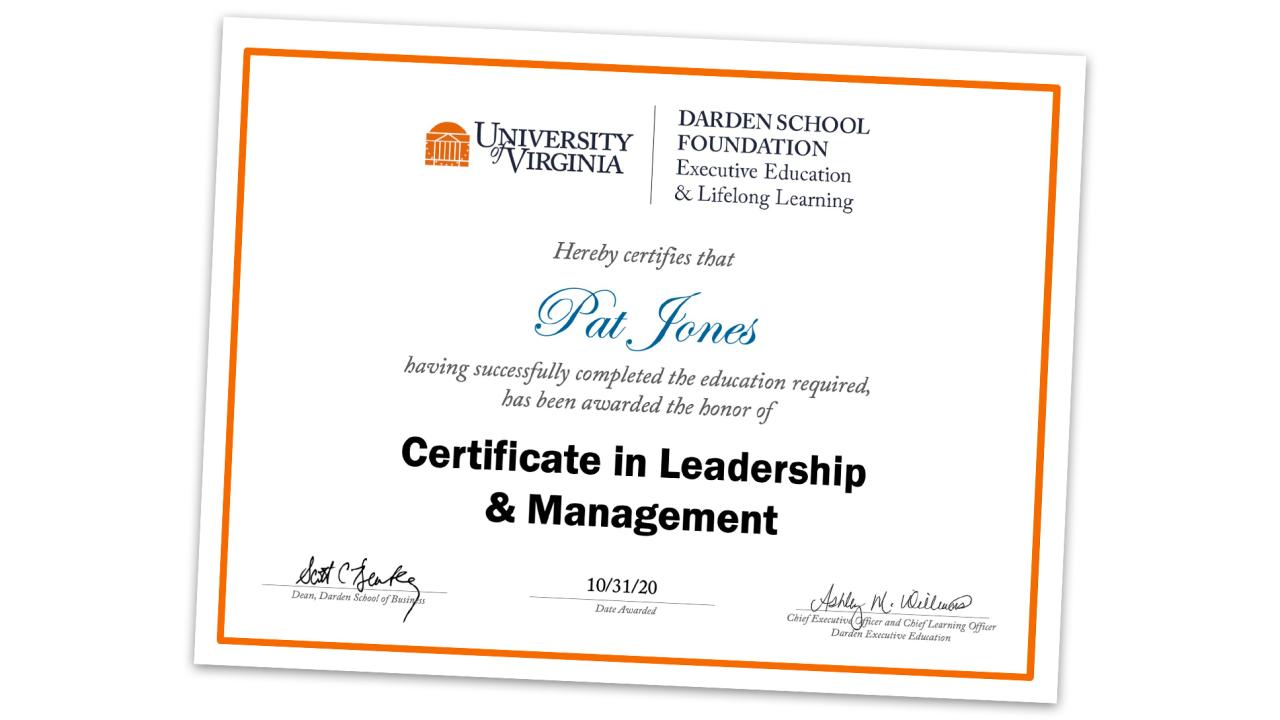In the dynamic landscape of modern organizations, leadership plays a pivotal role in driving success. A Certificate in Organizational Leadership empowers individuals to elevate their leadership capabilities, navigate complex challenges, and inspire teams to achieve extraordinary results.
This comprehensive program delves into the fundamental principles of organizational leadership, equipping you with the knowledge, skills, and credibility to excel in leadership roles across various industries and sectors.
Organizational Leadership Definition
Organizational leadership involves directing and inspiring teams within an organization to achieve its goals and objectives. It entails fostering a positive work environment, motivating employees, and making strategic decisions to drive the organization forward.
Effective organizational leadership encompasses a set of key principles, including:
- Establishing a clear vision and mission
- Communicating effectively and transparently
- Empowering and supporting employees
- Fostering collaboration and teamwork
- Adapting to change and innovation
Leadership Styles
Different leadership styles can be employed, each with its advantages and drawbacks:
- Autocratic Leadership:Centralized decision-making with limited employee input.
- Democratic Leadership:Collaborative decision-making with active employee participation.
- Laissez-Faire Leadership:Minimal interference, giving employees significant autonomy.
- Transformational Leadership:Inspiring and motivating employees to go beyond expectations.
- Transactional Leadership:Focused on rewards and punishments based on performance.
Effective Organizational Leadership in Practice
Examples of effective organizational leadership include:
- Satya Nadella (Microsoft):Transformed Microsoft into a cloud computing giant through strategic vision and employee empowerment.
- Indra Nooyi (PepsiCo):Led PepsiCo’s growth and expansion into new markets through innovation and global expansion.
- Howard Schultz (Starbucks):Built Starbucks into a global coffeehouse chain by fostering a customer-centric culture and employee engagement.
Benefits of a Certificate in Organizational Leadership
Pursuing a certificate in organizational leadership can unlock a world of career advantages and opportunities. It provides a structured learning path to enhance your leadership skills, knowledge, and credibility, setting you apart in the competitive job market.
Career Advantages
- Increased earning potential:Studies have shown that individuals with leadership certifications earn significantly higher salaries than those without.
- Promotion opportunities:A certificate demonstrates your commitment to professional development and qualifies you for higher-level leadership roles.
- Improved job security:In times of economic uncertainty, organizations prioritize retaining skilled leaders who can navigate challenges and drive results.
Enhanced Leadership Skills and Knowledge
- Strategic thinking:Leadership certification programs equip you with the tools and frameworks to develop and implement effective organizational strategies.
- Communication and interpersonal skills:You’ll learn to communicate effectively, build strong relationships, and inspire teams to achieve their goals.
- Conflict resolution and negotiation:Develop the skills to handle conflicts professionally and negotiate win-win solutions.
Credibility and Recognition
- Industry recognition:A certificate from a reputable institution demonstrates your expertise and commitment to the field of organizational leadership.
- Increased visibility:Certification can enhance your professional network and make you more visible to potential employers and clients.
- Professional development:A certificate program provides continuous learning opportunities, keeping you up-to-date with industry best practices and trends.
Course Content and Curriculum

Certificate programs in organizational leadership typically cover a comprehensive range of topics designed to equip learners with the knowledge and skills necessary to excel in leadership roles within organizations.
The curriculum often includes a combination of core courses and elective options, allowing students to tailor their learning experience to their specific interests and career goals.
If you’re interested in enhancing your leadership skills in organizational settings, consider pursuing a certificate in organizational leadership. This certification can provide you with a solid foundation in educational leadership and administration , enabling you to effectively manage and lead teams within educational institutions.
By obtaining this certificate, you can demonstrate your commitment to professional development and gain a competitive edge in the job market.
Core Courses
| Course | Learning Objectives | Key Takeaways |
|---|---|---|
| Organizational Theory and Leadership |
|
|
| Strategic Management |
|
|
| Organizational Behavior |
|
|
| Leadership Ethics and Values |
|
|
| Project Management for Leaders |
|
|
Program Structure and Delivery: Certificate In Organizational Leadership
Certificates in organizational leadership can be structured in various ways to accommodate different learning preferences and schedules.
There are three main delivery formats for certificate programs: online, in-person, and hybrid. Each format has its own advantages and disadvantages, so it’s important to choose the one that best suits your needs.
Online
- Advantages: Online programs offer flexibility and convenience, allowing you to learn at your own pace and on your own schedule. They are also often more affordable than in-person programs.
- Disadvantages: Online programs can be isolating, and it can be difficult to stay motivated without the support of a classroom environment. Additionally, you may miss out on the networking opportunities that are available in in-person programs.
In-person
- Advantages: In-person programs offer a more traditional learning experience, with regular class meetings and face-to-face interaction with instructors and classmates. This can be a more supportive and engaging learning environment, and it can also provide valuable networking opportunities.
- Disadvantages: In-person programs can be more expensive and less flexible than online programs. They also require you to travel to campus, which may not be convenient if you live far away.
Hybrid
- Advantages: Hybrid programs combine the best of both worlds, offering a mix of online and in-person learning. This can provide the flexibility and convenience of online learning with the support and engagement of in-person classes.
- Disadvantages: Hybrid programs can be more expensive than online programs, and they may not be as flexible as fully online programs.
The duration, time commitment, and schedule of a certificate program in organizational leadership will vary depending on the program and the delivery format. However, most programs can be completed in one to two years, with a time commitment of 10-15 hours per week.
If you’re seeking to enhance your leadership abilities in organizational settings, a certificate in organizational leadership can provide a solid foundation. However, if you aspire to advance your career in educational leadership, consider pursuing an m.ed educational leadership. This advanced degree will equip you with specialized knowledge and skills tailored to the unique challenges and opportunities within educational systems.
Nevertheless, for those primarily focused on developing their leadership capabilities in diverse organizational contexts, a certificate in organizational leadership remains an excellent choice.
Faculty and ors

The certificate program in organizational leadership is led by a team of experienced faculty and ors who are experts in the field. They bring a wealth of knowledge and experience to the classroom, and they are passionate about helping students develop the skills they need to be successful leaders.The faculty and ors involved in the certificate program have a variety of backgrounds and expertise.
They come from academia, business, and government, and they have a deep understanding of the challenges and opportunities facing organizations today. They are also actively involved in research, and they bring their latest findings to the classroom.
Mentors and Advisors
In addition to the faculty, the certificate program also offers students the opportunity to work with mentors and advisors. Mentors are experienced professionals who can provide students with guidance and support as they develop their leadership skills. Advisors are faculty members who can help students with their coursework and research.Mentors and advisors play a valuable role in the certificate program.
They can help students to:* Develop their leadership skills
- Network with other professionals
- Find internships and jobs
- Prepare for the future
Program Cost and Financial Aid
Earning a certificate in organizational leadership involves certain costs, and understanding these expenses is crucial. This section provides a comprehensive breakdown of the program cost, including tuition fees, materials, and other potential expenses. Additionally, we’ll explore the financial aid options available to students, such as scholarships, grants, and loans.
Finally, we’ll discuss the potential return on investment associated with obtaining a certificate in organizational leadership.
Program Cost Breakdown
The program cost can vary depending on the institution you choose to attend and the specific program structure. Generally, tuition fees constitute the most significant expense. These fees cover the cost of instruction, access to learning resources, and other academic services.
Additionally, you may need to purchase textbooks, course materials, and other supplies, which can add to the overall cost.
Financial Aid Options
To assist students in covering the cost of their education, various financial aid options are available. Scholarships and grants are forms of financial aid that do not require repayment. Scholarships are typically awarded based on academic merit, financial need, or other criteria set by the institution or sponsoring organization.
Grants are often need-based and can provide significant financial assistance to eligible students.
Loans are another option for financing your education. Unlike scholarships and grants, loans must be repaid with interest. There are different types of loans available, including federal student loans, private student loans, and institutional loans. It’s important to carefully consider the terms and conditions of any loan you take out, as they can impact your monthly payments and overall repayment costs.
Return on Investment
Pursuing a certificate in organizational leadership can provide a valuable return on investment. The knowledge and skills you gain can enhance your leadership capabilities, making you more effective in your current role and increasing your potential for career advancement. Studies have shown that individuals with leadership training tend to earn higher salaries and have greater job satisfaction compared to those without such training.
The return on investment can also be measured in terms of personal growth and development. The program can provide you with the opportunity to reflect on your leadership style, identify areas for improvement, and develop strategies for enhancing your effectiveness.
This personal growth can have a positive impact on your overall well-being and career trajectory.
Application Process and Requirements
To enroll in the certificate program in organizational leadership, you must meet specific eligibility criteria and follow the application process. This section will guide you through the requirements and provide tips for submitting a strong application.
Generally, the program is open to individuals with a bachelor’s degree from an accredited institution or equivalent work experience in a leadership or management role. Some programs may have additional prerequisites, such as a minimum GPA or specific coursework in business or leadership.
Eligibility Criteria, Certificate in organizational leadership
- Bachelor’s degree from an accredited institution or equivalent work experience
- Minimum GPA of 3.0 or higher (some programs may vary)
- Coursework in business or leadership (may vary by program)
- Relevant work experience in a leadership or management role (may vary by program)
Application Process
The application process typically involves submitting the following materials:
- Completed application form
- Official transcripts
- Resume
- Personal statement
- Letters of recommendation (may vary by program)
Tips for a Strong Application
To increase your chances of admission, consider the following tips:
- Highlight your leadership experience and skills in your resume and personal statement.
- Tailor your personal statement to the specific program you are applying to.
- Get strong letters of recommendation from individuals who can attest to your leadership abilities.
- Proofread your application carefully before submitting it.
Career Paths and Opportunities
Upon completing a certificate in organizational leadership, graduates can pursue various career paths in diverse industries. This certification equips individuals with the skills and knowledge to effectively lead and manage teams, organizations, and projects.
Graduates are highly sought after in sectors such as:
- Business and Management
- Healthcare
- Education
- Nonprofit Organizations
- Government
Examples of specific job titles and responsibilities for individuals with a certificate in organizational leadership include:
Project Manager
- Plan, organize, and execute projects from initiation to completion.
- Manage project budgets, timelines, and resources.
- Communicate effectively with stakeholders and team members.
Team Leader
- Motivate and lead teams to achieve organizational goals.
- Provide guidance, support, and feedback to team members.
- Resolve conflicts and foster a positive work environment.
Organizational Development Specialist
- Design and implement programs to improve organizational effectiveness.
- Conduct needs assessments, evaluate programs, and make recommendations.
- Facilitate workshops and training sessions on leadership and organizational development.
Human Resources Manager
- Manage all aspects of human resources, including recruitment, training, and employee relations.
- Develop and implement HR policies and procedures.
- Ensure compliance with employment laws and regulations.
Alumni Network and Support

Joining the alumni network associated with the certificate program offers a plethora of benefits for aspiring organizational leaders. The network provides a platform for:
- Networking opportunities to connect with fellow alumni, industry professionals, and potential employers.
- Professional development workshops, seminars, and conferences to enhance skills and knowledge.
- Mentorship programs that pair alumni with experienced leaders for guidance and support.
Alumni Success Stories
The alumni network boasts a remarkable roster of successful individuals who have made significant contributions to the field of organizational leadership. Their experiences and insights serve as valuable resources for current students and aspiring leaders.For instance, Sarah Johnson, an alumnus of the program, is now a renowned management consultant known for her expertise in organizational change.
She attributes her success to the knowledge and connections she gained through the program’s alumni network.Another alumnus, David Carter, is the CEO of a Fortune 500 company. He credits the program’s emphasis on leadership principles and practical application for his rise to the top of the corporate world.
Program Accreditation and Recognition
Program accreditation is a process by which an educational program is evaluated by an external organization to ensure that it meets certain quality standards. In the field of organizational leadership, accreditation is important because it provides assurance that the program is rigorous and relevant to the needs of the profession.There are a number of different accrediting bodies for organizational leadership programs, including the International Accreditation Council for Business Education (IACBE) and the Accreditation Council for Collegiate Business Schools and Programs (ACBSP).
If you’re looking to advance your leadership skills in the HR field, consider pursuing a certificate in organizational leadership. This program will provide you with the knowledge and skills you need to effectively manage and lead teams. It will also help you develop your strategic thinking, communication, and problem-solving abilities.
To further enhance your leadership capabilities, you may want to explore our hr leadership program. This program will provide you with the opportunity to learn from experienced HR leaders and develop the skills you need to succeed in a leadership role.
These accrediting bodies have developed a set of standards that programs must meet in order to be accredited. These standards cover a range of areas, including curriculum, faculty, and student support services.The certificate program in organizational leadership is accredited by the IACBE.
This accreditation means that the program has met the IACBE’s rigorous standards for quality and relevance. Graduates of the program can be confident that they have received a high-quality education that will prepare them for success in the field of organizational leadership.
Final Wrap-Up
Investing in a Certificate in Organizational Leadership is an investment in your professional growth and the future of your organization. Embrace this opportunity to transform your leadership potential and become a catalyst for positive change.
FAQ Section
What are the benefits of obtaining a Certificate in Organizational Leadership?
Enhancing leadership skills, gaining industry-recognized credentials, expanding career opportunities, and boosting earning potential.
What is the typical duration of a Certificate in Organizational Leadership program?
Programs typically range from 6 to 12 months, depending on the delivery format and course load.
What are the eligibility criteria for admission to a Certificate in Organizational Leadership program?
Programs may have varying requirements, but generally include a bachelor’s degree or equivalent experience in a related field.